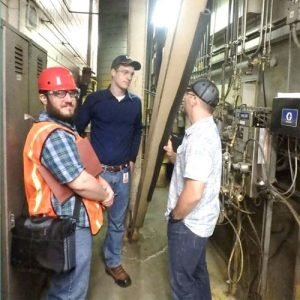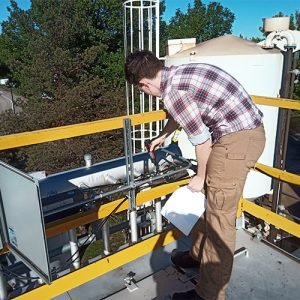What does a typical workday for employees at the Minnesota Technical Assistance Program (MNTAP) look like? It’s a lot like an episode of the Discovery Channel’s “How It’s Made,” according to MNTAP’s Intern Program Manager Matthew Domski. Like that show, which gives viewers a behind-the-scenes look at how things are manufactured, “we physically go into a facility and follow a product from start to finish — but what we’re looking for are ways the manufacturer can make the process more environmentally friendly,” says Domski. “Can the use of chemicals be minimized? Are there ways to conserve water and energy? What are the manageable changes we might be able to recommend to help the facility conserve resources, reduce pollution, and minimize employee exposure to potentially harmful elements?”

For 40 years, MNTAP has helped thousands of Minnesota businesses save money, reduce waste, ensure safer workplaces, and protect the environment for the benefit of all Minnesotans. Originally created by the Minnesota Legislature in 1984 and housed in the University of Minnesota School of Public Health since then, MNTAP’s practical, technical assistance has improved public safety and environmental protection across various sectors of Minnesota’s economy, including manufacturing, food production, healthcare, and wastewater treatment.
Expanding Protections
In the past four decades, MNTAP has conducted more than 5,200 site visits, and its recommendations have saved Minnesota businesses over $58 million, 900 million gallons of water, 117 kilowatt hours (kWh) of energy, and over 400 million pounds of waste. In the past year alone, MNTAP’s interventions have benefited all Minnesotans by saving over two million pounds of waste, 14 million gallons of water, and 13.8 million kWh of energy.
MNTAP was originally envisioned as a way to help smaller businesses navigate environmental regulations, particularly with regard to hazardous waste disposal, with nearly all its funding coming from the Minnesota Pollution Control Agency (MPCA). The MPCA approached UMN leadership with a proposal to house the new program at the School of Public Health (SPH).
“They felt that hazardous waste was a threat to human and environmental health, and the School of Public Health was well positioned to manage those potential harms,” said MNTAP Director Kelsey Klucas.
That relatively narrow mandate—focused on small business and hazardous waste—expanded significantly in 1990, when the legislature enacted the Minnesota Toxic Pollution Prevention Act, which established a “pollution prevention assistance program” for all businesses or entities in the state using, generating, or releasing toxic pollutants or hazardous substances or hazardous wastes.

“Our original mandate was focused on helping small businesses handle their hazardous waste, but with the new legislation in 1990, that mandate was extended to all businesses and covered a more comprehensive pollution prevention plan for them,” says Klucas. “That took MNTAP from being a hazardous waste group for smaller businesses to a pollution prevention group that would serve all businesses. It really expanded both MNTAP’s scope and our effectiveness.”
MNTAP’s expanded role, according to Senior Engineer Jane Paulson, was meant to help businesses across the state remain in compliance with the raft of new environmental regulations the legislature had enacted. “The state was passing more and more environmental regulations so they thought, if we’re going to require our manufacturers to follow these rules and meet all these regulations, we need to give them some help,” says Paulson. “They also intentionally put MNTAP outside of the formal regulatory structure so companies would feel safe coming to us for guidance and advice.”
Signature Achievements
Throughout its history, one of MNTAP’s standout programs has been its summer internship initiative, where engineering and environmental science students work with Minnesota businesses on longer-term projects to tackle specific environmental challenges. Over the years, MNTAP interns—367 people in total—have worked with 325 Minnesota businesses on innovative solutions to their environmental challenges.
Another achievement cited by MNTAP is its key role in helping Minnesota rid itself of trichloroethylene (TCE), a chemical solvent linked to several types of cancer, nerve damage, and other diseases. As TCE was banned by the state, MNTAP played a key role in working with Minnesota businesses to transition to a safer replacement chemical. “Rather than just switching to something similar, which may have negative health consequences, we worked with businesses to help them transition to replacements for trichloroethylene that would be truly safer for the long term,” says Paulson, who also noted that MNTAP is currently adopting a similar approach to help businesses identify and eliminate PFAS.
MnTAP has maintained a close working relationship with the MPCA—with about half of its funds still provided through a recurring grant—but it has also diversified its sources in recent years to include a variety of other funding partners such as: the Metropolitan Council, the Minnesota Department of Commerce, the U.S. Environmental Protection Agency EPA, Environment and Natural Resources Trust Fund, Xcel Energy, and other MN utilities.

